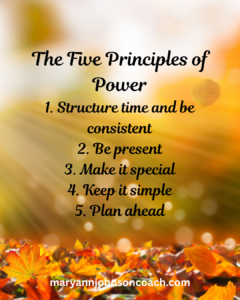 I love the Five Principles of Power (formerly the Five Rules of Engagement). I didn’t have them fully formed in my mind when I began working with parents and helping them connect with their children. I just knew what children needed: to learn well, connect, and thrive.
I love the Five Principles of Power (formerly the Five Rules of Engagement). I didn’t have them fully formed in my mind when I began working with parents and helping them connect with their children. I just knew what children needed: to learn well, connect, and thrive.
In the beginning, I connected the principles with education, as I worked with families who homeschooled. As I have transitioned to working with all families, regardless of how they educate, I have witnessed the power these principles have in not only learning, but in family systems, relationships, communities, etc. They are powerful when planning and executing activities, cooking together, sharing new ideas, adjusting family systems, doing chores, yard work, gardening, etc. When you utilize these principles, children will engage better in whatever you are doing.
The Five Principles of Power
1. Structure time and be consistent
2. Be present
3. Make it special
4. Keep it simple
5. Plan ahead
Last week, I shared how principles 1 and 2 helped me commit to and become successful in learning to meditate. Today, we will dive deeper. Then, in the next few weeks, we will learn more about the other principles. As you internalize these principles, you will see greater success in all parts of your life. This is a promise I can make based on my own experience.
Principle 1
Structure time and be consistent. In other words, show up regularly. For anything to happen in life, we must carve out time for it and then make a commitment to that time; we have to be consistent. It’s also helpful to understand that although we structure time so that the things that matter happen, we need to be flexible with what happens during that time.
- If you homeschool, you structure a time for learning.
- You might structure how Sundays are spent in your home.
- It could be family time on a given day or evening.
- You might structure what you want to see happen in the car while on a long trip.
- It might be a plan for the days of a vacation.
- It’s important to structure time and be consistent anytime your family comes together for a specific purpose.
Be Flexible With Content
On a vacation, you may all be doing the same thing, but there’s still flexibility. One child may choose to record the family trip in a journal, another may choose to take photographs, and another may not record anything at all. On a long car trip, parents may have audiobooks for the family to choose from. The family may sing songs together, but not chide the one who just listens. The point is the trip was planned, and then happened. The time was honored, but the content was flexible.
What If Something Goes Wrong
I received an email from a mom who took one of my classes, where I introduced the five principles. She returned home and structured time for family activities, but everyone came down with colds. She shelved the family time for a week, hoping all would soon be well and they could start again.
I raised seven children, and I know what it’s like when everyone feels poorly. However, when creating a truly magical and amazing family culture, structured time and consistency matter. So how do we keep to that structure when things aren’t going well, as in the case of a family with a cold?
My suggestion is to hold true to the time. If you have a once-a-week family evening activity, do it, but modify it. Gather your children around you. Have pillows and blankets, and people resting on the carpet. Give everyone a glass of juice or hot chocolate. Smile while drinking. Have a few moments of small talk or a prayer. Then call it good. The point is to be consistent, to honor the time. It allows your children to depend on it, to understand that family activities matter.
Illness isn’t the only thing that will challenge you as you work to honor time set aside for family. There will be days when you have made more commitments than you can manage. We all do it occasionally. When that happens, gather your children together, have everyone share a joke, eat a treat, and call it good. The kids may not like ending early, as they tend to come to love and depend on family time, but something is better than nothing, and they know it. Consistency counts.
Whatever you do as a family, honor it. Consider it sacred time with your children, so they know you can be counted on to follow through.
Principle 2
Be present. Being present means you’re engaged with your children; you’re in the same space with them physically, mentally, and emotionally. It doesn’t mean getting them settled and then going off to do your own thing. It means being together. You learn together, play together, work together, and have fun together. When you’re present, it helps with management and order. It does not, however, mean micromanaging everyone’s activity or efforts.
Being present is a gift to whomever we give it to. It’s listening without texting, answering the phone, checking email, or watching the TV out of the corner of our eye. Being present is being all ears and eyes for what’s happening now. Children and teens feel more secure and happy when parents are present.
Who Will This Work For
These principles apply whether you have toddlers, young children, teens, older adults, or even if your family consists of three older people. : ) Each day at lunch, we have a family activity – we listen to something that will enlighten and lift us. It’s easy to become distracted and miss most of the audio. It’s also easy to forget to do it. However, when we allow this to happen, after a day or two, one of us will say, “Hey, shouldn’t we listen to something?” Doing this as a family matters, and understanding the power of consistency helps it happen more regularly.
We also have an activity we do every Tuesday. It isn’t always easy to get up, dressed, and into the car, but we have been very consistent for over three years.
Then hip surgeries happened. We stopped doing the activity because we physically couldn’t get in the car or drive. Now we have healed enough to resume this activity, but it’s been hard to get back on the wagon. This is another reason that structuring time and then honoring that time, consistently, matters; picking it up again can be hard, and often you won’t.
When we set aside time to be with our family, whether it’s daily, weekly, or even monthly, and then make it happen consistently, it builds a sense of trust that blesses us far beyond the activity itself. When children can trust that we care and they matter, they are freer to come to us when they’re in need.






